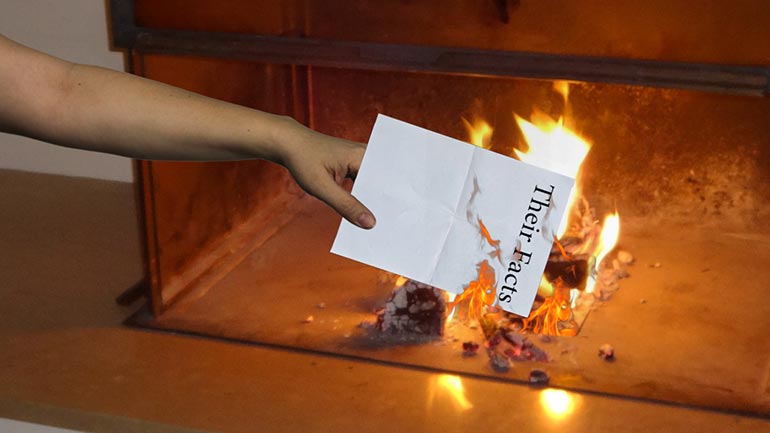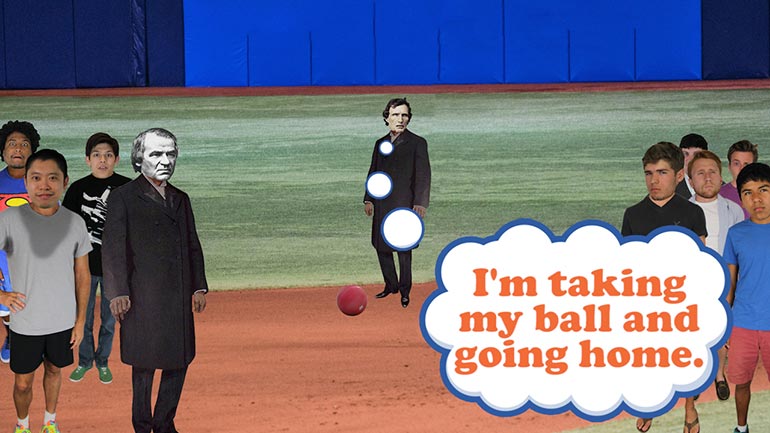ShmoopTube
Where Monty Python meets your 10th grade teacher.
Search Thousands of Shmoop Videos
ELA 5: Context Clues 441 Views
Share It!
Description:
Grab your detective coat and weird hat, we're clue-hunting today. We may not be solving murder-mysteries...but we'll definitely figure out some definitions of words. And trust us, that's pretty much just as important.
Transcript
- 00:04
[Coop and Dino singing]
- 00:13
Have you ever wanted to be like Sherlock Holmes? [Man dressed like Sherlock Holmes]
- 00:16
You know, just pick up a magnifying glass, solve a mystery, and save a bunch of people?
- 00:20
Well, here’s your chance, because today, we’re looking at context clues. [Sherlock Holmes and a man tied to a chair in a room]
- 00:24
Okay, so you might not save any lives.
Full Transcript
- 00:26
But you'll figure out the meanings of unknown words, which is pretty much the same thing. [Boy collapses to the floor in class]
- 00:31
…Maybe.
- 00:32
Don't think too hard about that.
- 00:33
Anyway, let's get started!
- 00:35
Clue #1: Definition Clues. [Magnifying glass held over definition clues]
- 00:37
Definition clues are when the meaning of the word you don’t know is actually contained
- 00:41
in the sentence.
- 00:42
For example, let’s say we came upon the word feeble in a sentence…and would you
- 00:46
look at that, we happen to have a sentence right here!
- 00:49
What are the odds…? [Book appears with short paragraph]
- 00:50
“The man seemed very feeble and I was sure that he was as weak as he was old.”
- 00:55
We may not know what the word feeble means…
- 00:57
But look at the last part of the sentence…
- 00:58
“He was as weak as he was old.”
- 01:00
That's a definition context clue if we ever saw one. [Paragraph stamped with definition clue]
- 01:03
In fact, “feeble” actually means “weak due to old age.”
- 01:07
Okay, so you’ve mastered the definition clue.
- 01:09
But that’s kid stuff.
- 01:10
We know you can handle some more advanced detective work.
- 01:14
Lucky for you, we've got just the thing. [Magnifying glass held over example clues]
- 01:16
Clue #2: Example clues.
- 01:18
Example clues are when an example of the word appears in the sentence or elsewhere in the text.
- 01:22
Let’s look at one with the word hazard. [A hazard sign post]
- 01:25
“The road was full of hazards.
- 01:27
There were holes, nails, and giant bumps everywhere.”
- 01:30
So even if we don’t know the meaning of the word hazard…
- 01:32
The next sentence gives us examples of different hazards, [A bumpy road with holes and nails]
- 01:35
including “holes, nails and giant bumps.”
- 01:38
So, hazards?
- 01:38
Probably not a good thing...
- 01:40
…and definitely something to avoid when riding around in your detective-mobile. [Man screaming as car is on fire]
- 01:43
This case isn't solved yet, gumshoes…
- 01:45
Let's check out clue #3: Inference Clues.
- 01:48
Inference clues are words or phrases that might help us figure out – or infer – the [Coop teaching inference clues]
- 01:52
meaning of the word that we don’t know.
- 01:53
For example, the word nonchalant.
- 01:56
“She was very nonchalant about context clues. [Girl looking at a PC screen and plays with her hair]
- 01:58
She sat back at her desk, yawned, and played with her hair.”
- 02:02
We may not know the meaning of nonchalant, but picture the person described…
- 02:06
From the description, we can infer that “nonchalant” probably means something like calm and unconcerned.
- 02:10
Which is the exact opposite of us and this whole "detective" thing.
- 02:13
You can tell by our trench coat that we're taking this seriously. [Girl walks in room with two detectives and man tied to a chair]
- 02:16
…Maybe too seriously.
- 02:18
But it takes a seriously good detective team to figure out clue #4: Synonym clues.
- 02:23
Look for words in the sentence that seem to have the same meaning. [Dino teaching about synonym clues]
- 02:26
For example, with the word obsolete…
- 02:28
“Cassette tapes are obsolete and so out-of-date that you can’t even find them anymore.”
- 02:33
The synonym for “obsolete” is “out-of-date”.
- 02:36
Which may also be a synonym for us… are Walkmans not cool anymore…? [Man walks by with a walkman]
- 02:40
Anyway, that leads us to – dun, dun, dun – the final clue.
- 02:43
Clue #5: Antonym clues.
- 02:45
As you may have guessed, antonym clues are the opposite of synonym clues. [Coop discussing antonym clues]
- 02:49
So, look for a word that means the opposite of the word you don’t know.
- 02:52
Like this…
- 02:53
“Cassette tapes are obsolete because people prefer modern ways of listening to music.”
- 02:57
Here, “modern” is clearly the antonym for “obsolete”.
- 03:00
So we know obsolete still means out-of-date.
- 03:02
And there you have it.
- 03:04
You just cracked the case. [Detectives, kid and man with walkman walk out of a room]
- 03:05
Congratulations, gumshoe!
- 03:06
We're not quite sure what the case actually was, but…whatever, you did a great job.
Up Next
Check out the best bias video ever made, courtesy of the most awesome and amazing educational website in existence.
Related Videos
No, this isn't a terrible new mint-peach bubble gum flavor...though it does tend to leave a bad taste in people's mouths.
Those settlers in Jamestown really should have settled down with all that land-stealing. Tobacco's bad for you anyway.
Being born out of multiple wars doesn't quite seem to fit the peaceful, polite Canadians we know and love today...oh wait, they were called The Bea...
Not every cartoon is meant to entertain small children while their mother gets some "Mommy time." There are also political cartoons, which are mean...




